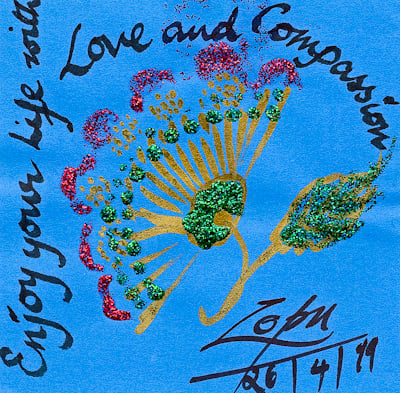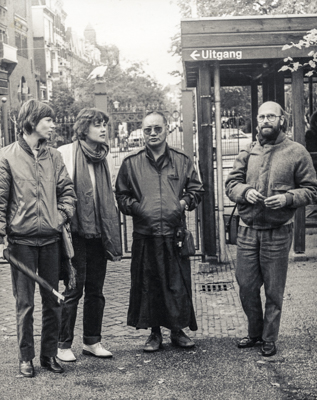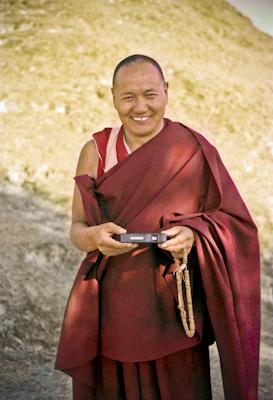Dear Friends,
We wish you a happy and safe 2023! As always, thank you for your interest in the Lama Yeshe Wisdom Archive and for subscribing to our monthly eletter. Please feel free to share it with others.
As for us, 2023 is getting off to a great start! As many of you already know, our latest free publication by Lama Yeshe, Knowledge-Wisdom: The Peaceful Path to Liberation, is now available to order on our website! Knowledge-Wisdom includes new material and complete discourses edited by Nicholas Ribush and published for the first time. This book is now available in print and as an ebook. You can also read excerpts on our website. We acknowledge the kindness of Ven. Tenzin Drachom and students in sponsoring the production of this book.
Thanks again to everyone who generously contributed to our 2022 year-end appeal. Without your support we would not be able to do what we do!
From the Video Archive: Compassion, Equilibrium and Immeasurable Motivation
This month from the video archive, Lama Yeshe discusses the function of equilibrium in developing compassion and the importance of our motivation. These teachings were hosted by Maitreya Instituut in Naarden, the Netherlands in October, 1980.
Visit and subscribe to the LYWA YouTube channel to view more videos freely available from our archive. See also the FPMT YouTube channel for many more videos of Lama Zopa Rinpoche’s teachings.
On the LYWA Podcast: The Essence of the Dharma
 The essence of the Dharma is to subdue one’s mind by taming the disturbing, obscuring, emotional thoughts that bring so much suffering to yourself and to others, from life to life.
The essence of the Dharma is to subdue one’s mind by taming the disturbing, obscuring, emotional thoughts that bring so much suffering to yourself and to others, from life to life.
-Lama Zopa Rinpoche
This month on the LYWA podcast Lama Zopa Rinpoche discusses verse 183 from the Dhammapada, “Engage in the perfect wholesome action, virtuous action. Subdue one’s own mind. This is the teaching of the Buddha.” Rinpoche also leads us in the ultimate exercise to subdue the mind: a contemplation of emptiness. This teaching is from the 33rd Kopan Course in 2000. You can read along with a transcript of these teachings here on our website.
The LYWA podcast contains hundreds of hours of audio, each with links to the accompanying lightly edited transcripts. See the LYWA podcast page to search or browse the entire collection by topic or date, and for easy instructions on how to subscribe.
WHAT'S NEW ON OUR WEBSITE
 This month we have posted a Lamrim Year Crosswalk PDF available for download on the Lamrim Year Companion website. The crosswalk is a navigational guide created to support students who wish to extend their understanding of the teachings found in Lamrim Year by reading the corresponding section of the renowned book Liberation in the Palm of Your Hand, by Pabongka Rinpoche.
This month we have posted a Lamrim Year Crosswalk PDF available for download on the Lamrim Year Companion website. The crosswalk is a navigational guide created to support students who wish to extend their understanding of the teachings found in Lamrim Year by reading the corresponding section of the renowned book Liberation in the Palm of Your Hand, by Pabongka Rinpoche.
Every month we share new advices for Lama Zopa Rinpoche’s Online Advice Book, adding more than 100 new entries every year on a variety of topics.
- Benefits of Caring for Our Parents: This advice was given to a student whose brother was taking care of their parents. Rinpoche explained the great merit collected by serving our parents and said if we understand their kindness, offering service to them will come from our heart.
- Motivation for Having a Child: A student asked Rinpoche whether they should have a baby or not. Rinpoche advised that a positive attitude is the most important thing.
- There Is Nothing That Belongs to You: A nun wrote that she had been donating money to a monastery but later found out that the lay manager of the monastery guesthouse had cheated her by secretly withholding quite a lot of money for himself. Rinpoche typed this reply.
- The Only Solution Is Dharma: Rinpoche offered a billion, trillion thanks from his heart in this letter to a nun who had translated a text and provided commentary to students. He said that her kindness brings great benefit to so many sentient beings at this time of unbelievable suffering in the world.
You can always find a list of all the newly posted advices from Lama Zopa Rinpoche on our website.
Purchasing and Shipping LYWA Titles
 As many of you have noticed, shipping costs have risen sharply over the past couple of years, particularly international rates. We do our best to ship using the most economical and reliable service available for an order. FedEx offers us rates at a significant discount, and has the most reliable service. We will typically ship international orders with FedEx, as the US Postal Service (USPS) does not provide tracking and customs services outside the US.
As many of you have noticed, shipping costs have risen sharply over the past couple of years, particularly international rates. We do our best to ship using the most economical and reliable service available for an order. FedEx offers us rates at a significant discount, and has the most reliable service. We will typically ship international orders with FedEx, as the US Postal Service (USPS) does not provide tracking and customs services outside the US.
If you are shipping your order to a country in the EU, please note that as of July 1, 2021, EU regulations changed so that VAT will need to be collected on all commercial goods imported into the EU, including free books. Please be aware shipping rates offered in our online store do not include VAT or any possible customs clearance fees the shipping carrier may require to be paid before they will release the package. LYWA will cover VAT for Members, and for orders which include a donation of $10 or more.
If you are ordering from Australia, some of our titles are available to be dispatched by a volunteer distributor in Australia for much less than if they were shipped from the US. These titles are: Big Love, Lamrim Year, and The Nectar of Bodhicitta. When you order a book and proceed to the check out, if we have stock in Australia, you will see the "Special Rate" offered on the shipping page.
No matter where you are, if the shipping costs are prohibitive for you, please remember:
- Electronic versions of almost all of our titles are available in a variety of ways: to read online on our website; as a free PDF download; as an ebook through various ebook vendors; and as audiobooks. Please visit the book's page in our online store to see all the available options.
- You can purchase a print copy of some of our titles through Amazon's Print-on-Demand service. Depending upon your location, the shipping may be more affordable. Note if you are in Australia, Amazon prints locally in Australia and can mail to you for a domestic shipping rate.
- You may be able to pick up a copy of our books at your local FPMT center. Visit the FPMT website to locate your nearest center.
Thank you so much, and please enjoy this teaching from the forthcoming Lama Yeshe book Clean Clear: Collected Teachings, Volume 2.
Big love,
Nick Ribush
Director
THIS MONTH'S TEACHING: Refuge in the Three Rare Sublimes
 This morning I’m going to talk about taking refuge in Buddha, Dharma and Sangha, which is the way we enter the path to enlightenment. Therefore, this is an important topic.
This morning I’m going to talk about taking refuge in Buddha, Dharma and Sangha, which is the way we enter the path to enlightenment. Therefore, this is an important topic.
In order to take refuge in Buddha, Dharma and Sangha we need to have cultivated a certain degree of understanding wisdom. Why is that? In order for our refuge to be strong we need a clear understanding of our reasons for taking it. The purpose of taking refuge is to produce more happiness and peace. For that to happen we have to comprehend our own reality. When we do, we can see how worthwhile refuge is. Without such comprehension, taking refuge can actually be the cause of misery and dissatisfaction, because at present we take refuge in objects of sense pleasure. We already take refuge, but our attitude for doing so is mistaken.
To take Buddhist refuge, we have to change our attitude from seeking materialistic sense pleasure to reliance on Dharma wisdom. In order to do this, we have to gain the wisdom that recognizes as pleasure our misconceptions of holding what are actually miserable situations and confused reactions. Normally we sink all our interest and energy into this kind of thing and have neither strength nor confidence in that which is invisible to us: the reality of the Dharma.
Remember what Nagarjuna said? It’s better not to have the itching than the pleasure of scratching.1 When we have some kind of skin irritation and experience the relief when we scratch it as pleasure, that’s a wrong conception. This is a perfect example of how we hold any sense pleasures we experience as true happiness, or, similarly, how we believe that the relief of pain is happiness. These are wrong conceptions; we are conceiving suffering as pleasure and happiness. Another of our wrong conceptions is to hold impermanent phenomena as permanent.2 In order to properly take refuge in wisdom we have to be intellectually clean clear and convinced that such mistaken beliefs are wrong conceptions.
As you can see, we keep ourselves busy twenty-four hours a day just thinking of this life alone: what to do, how to do it, what to do, what to do, how to get pleasure? This extreme attitude of concern for only the pleasure of this life is like a fire that burns whatever confidence we have in our inner wisdom, burns our inspiration for taking refuge. Therefore, it’s essential that we maintain a fundamental mindfulness of the eight worldly dharmas. This is crucial when we beginners start to take refuge.
Nagarjuna explained the eight worldly dharmas as four pairs of opposites: craving for material possessions and aversion to a lack of them; craving for happiness and comfort and aversion to unhappiness and discomfort; craving for a good reputation and aversion to a bad one; and craving for praise and aversion to criticism.3
For example, being happy when you get a Christmas present and being unhappy if you don’t. Or being happy when people speak well of you and unhappy when they don’t. If we are not mindful, we’re liable to take refuge under the influence of the eight worldly dharmas. That doesn’t work. In that case our refuge is like a balloon. It floats up into the air and disappears. If someone criticizes us or sullies our reputation, we get really upset and want to beat them up. That shows how incredibly we grasp at the pleasure of a good reputation. We’re so hung up on people thinking well of us that if someone says bad things to us we freak out. This all stems from a lack of wisdom, not understanding the evolution of the ego trip and how that leads to our tremendous grasping at sense pleasure. It’s just as Nagarjuna said when he spoke about scratching an itch.
If we understand our own false view, we can begin to gain control over our mind. That can eventually lead to integration, concentration and penetrative insight. The characteristic nature of the worldly dharmas is distraction. We are always distracted; therefore, it is very important to release our tremendous ambition to gain the transitory world pleasures we crave.
Of course, reputation itself is not the problem. As a matter of fact, reputation comes from other people, from mother sentient beings. A good reputation, for example, comes from others speaking well of you; it comes from other people. They talk, talk, talk and perhaps you get a good reputation. However, the problem is that then your preconception ego sort of accepts it, gets hung up on it and obsesses over it. That is the problem. The pleasure of having a good worldly reputation manipulates you into a suffocating trap. It’s a trip; it’s completely a trip. You feel fantastic. You see only the good aspects of it. And that’s what hooks you into the trap.
Therefore, it is important to recognize the ridiculous, fanatical view of the up-and-down mind. Our small, narrow mind gets caught up in such small pleasures, thinking these tiny, transitory experiences are so big. Avoiding, abandoning and smashing this fanatical mind is the way to freedom; freedom from being manipulated again and again by our negative mind. It forces us to react to situations this way, that way, this way, that way repeatedly. We have no freedom, no choice; we just have to roll with it. We come, we go, we come, we go. Even though our big ego thinks, proudly, “I’m freeeee,” we’re not. We can see through our own experience that this is true. I mean, sometimes we really don’t know what we’re doing. We have no intention, no plan, we just act. That’s our situation.
Thus, to enter the spiritual path to enlightenment, first it’s important to rid our mind of these eight worldly phenomena from which our lack of freedom arises.
Lama Yeshe gave this teaching in Holland in October 1980. Edited from the Lama Yeshe Archive by Nicholas Ribush for the forthcoming Lama Yeshe book Clean Clear: Collected Teachings, Volume 2. The video of this talk may be found on the LYWA YouTube channel.
Notes
1 If you scratch an itch, it feels good, but it feels even better to have no itch at all. So too, one is happy in obtaining worldly desires, but there is greater happiness in having no desires at all.
—Nagarjuna’s Precious Garland: An Epistle to a King, verse 168.
Translated by John Dunne and Sara McClintock. Boston: Wisdom Publications, special limited edition, 1997. [Return to text]
2 Lama Tsongkhapa described our four fundamental misconceptions as believing (1) the impure to be pure; (2) suffering to be happiness; (3) the impermanent to be permanent; and (4) the selfless to have a self. [Return to text]
3 See Lama Zopa Rinpoche’s How to Practice Dharma: Teachings on the Eight Worldly Dharmas. Boston: LYWA, 2012. [Return to text]





























